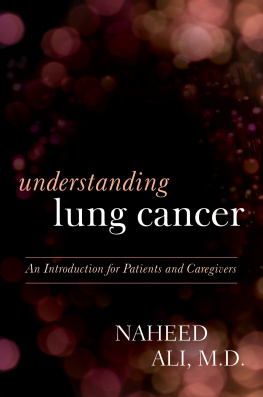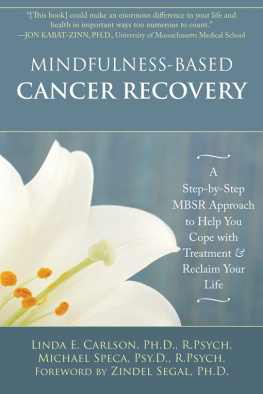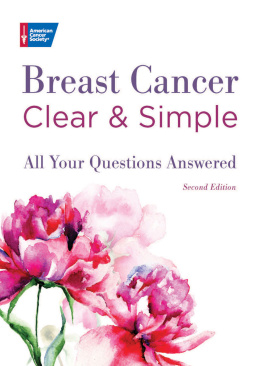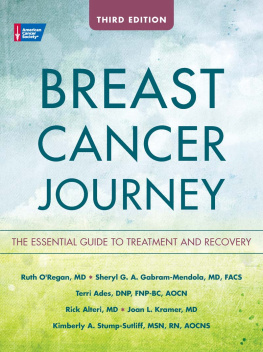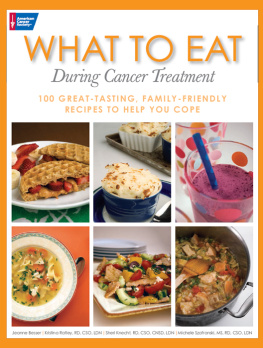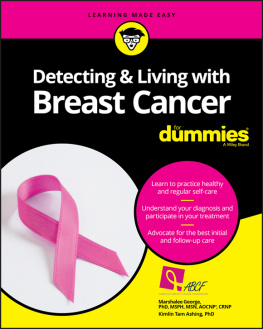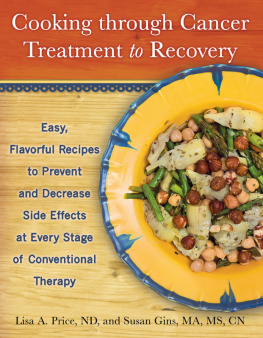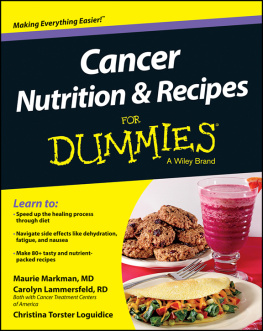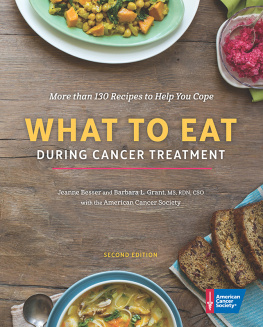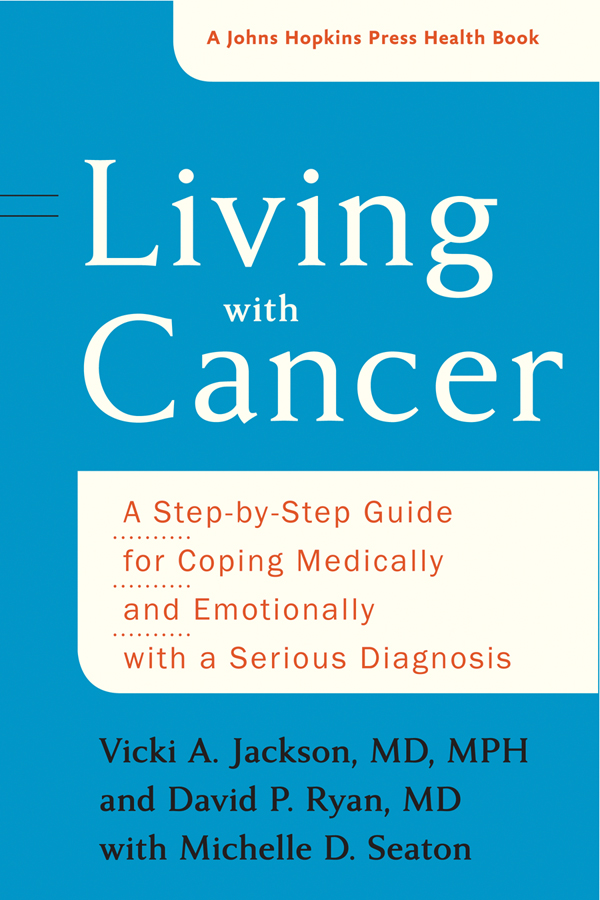A Step-by-Step Guide
for Coping Medically
and Emotionally
with a Serious Diagnosis
Vicki A. Jackson, MD, MPH
David P. Ryan, MD
with Michelle D. Seaton
Johns Hopkins University Press|Baltimore
Note to the reader : This book is not meant to substitute for medical care of people with cancer, and treatment should not be based solely on its contents. Instead, treatment must be developed in a dialogue between the individual and his or her physician. Our book has been written to help with that dialogue.
Drug dosage : The author and publisher have made reasonable efforts to determine that the selection of drugs discussed in this text conform to the practices of the general medical community. The medications described do not necessarily have specific approval by the US Food and Drug Administration for use in the diseases for which they are recommended. In view of ongoing research, changes in governmental regulation, and the constant flow of information relating to drug therapy and drug reactions, the reader is urged to check the package insert of each drug for any change in indications and dosage and for warnings and precautions. This is particularly important when the recommended agent is a new or infrequently used drug.
2017 Vicki Jackson and David Patrick Ryan
All rights reserved. Published 2017
Printed in the United States of America on acid-free paper
987654321
Johns Hopkins University Press
2715 North Charles Street
Baltimore, Maryland 21218-4363
www.press.jhu.edu
Library of Congress Cataloging-in-Publication Data
Names: Jackson, Vicki A., 1968, author. | Ryan, David P., 1966, author. | Seaton, Michelle D., author.
Title: Living with cancer : a step-by-step guide for coping medically and emotionally with a serious diagnosis / Vicki A. Jackson, MD, MPH, David P. Ryan, MD, Michelle D. Seaton.
Description: Baltimore : Johns Hopkins University Press, 2017. | Series: A Johns Hopkins Press health book | Includes index.
Identifiers: LCCN 2016033369 | ISBN 9781421422329 (hardcover : alk. paper) | ISBN 1421422328 (hardcover : alk. paper) | ISBN 9781421422336 (pbk. : alk. paper) | ISBN 1421422336 (pbk. : alk. paper) | ISBN 9781421422343 (electronic) | ISBN 1421422344 (electronic)
Subjects: LCSH: Cancer. | CancerPatientsCare. | CancerPsychological aspects. | CancerPatientsLife skills guides.
Classification: LCC RC263 .J33 2017 | DDC 616.99/4dc23 LC record available at https://lccn.loc.gov/2016033369
A catalog record for this book is available from the British Library.
Special discounts are available for bulk purchases of this book. For more information, please contact Special Sales at 410 -- 6936 or specialsales@press.jhu.edu.
Johns Hopkins University Press uses environmentally friendly book materials, including recycled text paper that is composed of at least 30 percent post-consumer waste, whenever possible.
CONTENTS
PREFACE
Every cancer specialist receives daily or weekly phone calls from friends of friends who have a cancer diagnosis or are in treatment and yet they have so many unanswered questions. These patients have all heard what the doctor said to them in the clinicor thought they didbut afterward they often have trouble making sense of that information. This confusion is completely understandable. There are few experiences more disorienting than hearing the words, You have cancer. Every phase of treatment can seem equally disorienting, like entering a new world filled with tests and scans and jargon. Patients are often at a loss as to how to ask the right questions of their oncologists and nurse practitioners about the treatments they undergo. They struggle to discuss in detail their emotions and symptoms in a busy clinical setting.
At Massachusetts General Hospital, we have come up with a novel integrated approach to treating patients with a serious cancer diagnosis. We offer them the opportunity to meet with both an oncologist and a palliative care specialist. The oncologist can focus on tests and scans and treatments for the cancer, while the palliative care specialist, with expertise in symptom management, focuses on how you are living with the cancer and the treatments. Its like meeting with an additional doctor, someone who is focused on how you are really doing, both physically and emotionally, living in this new cancer world.
For more than ten years, we have worked with many of the same patients, answering their questions while also offering each other our different perspectives on patient care. Weve learned that its not easy to stay oriented in the complex world of cancer treatment. People often need to hear information more than once. They need strategies to help them live fully and take advantage of the days when they feel strongest. And they love hearing about how other patients have dealt with situations similar to theirs. This book is the result of all of that work with our patients. We wanted to create a guide to help answer peoples questions and empower them to ask many more questions of their own medical care team members.
When we decided to write this book, we enlisted the help of Michelle D. Seaton, a medical writer who was able to follow us in the clinic and watch our interactions with patients. She also interviewed patients and used all of this information to help craft our ideas into the book you hold now. Because of privacy concerns, the patient stories you read here are composites of the many thousands of patients we have treated.
This book reflects our understanding that the cancer experience is very different today than it was even a few years ago. New treatment options abound, including targeted therapies and better chemotherapy, which means that people who receive anticancer therapies often do well for a long time, even if their disease has spread beyond the original location (metastasized). We firmly believe that patients with a serious cancer diagnosis do better and feel better if they have a dedicated resource to help them manage the symptoms and side effects of treatment, one that motivates them to think about their goals, about the future, and about their quality of life. Patients feel more empowered when they have someone encouraging them to track and talk about their symptoms, someone who is offering them strategies for maintaining their quality of life. We wanted this book to be that resource. We want patients to concentrate on today, on living the best life they can right now.
Vicki A. Jackson, MD, MPH
David P. Ryan, MD
Living with Cancer
How Am I Going to Get through This?
VICKI ANSWERS FIRST:
Im sorry that you have to read this book. This is probably the last place you thought you would be, reading a book about dealing with a diagnosis of cancer or helping someone you love adjust to this new reality. It can all feel surreal and overwhelmingthe diagnosis, the medical jargon, the treatment options, the need to find specialists who can help you and with whom you feel comfortable. After a preliminary diagnosis, you may have a lot of urgent appointments for tests and further scans, or a biopsy or surgery, while also enduring days of anxious waiting. Throughout all of this it may seem impossible to believe any of the results. You want to shake the world and shout, This cant be happening!
Its hard for most medical professionals to fully understand the profound changes that people are asked to go through when they receive a cancer diagnosis. I got a glimpse of this shortly after I became a palliative care doctor. I remember standing in the lobby of a hospital in Boston on the morning of 9/11. Wed gathered there after news of a hijacking had spread, and we watched on TV as the towers collapsed. Like everyone else I kept watching it over and over again because I couldnt grasp what was going on. I saw it, but I couldnt quite believe it. Thats when a patient took my arm and said, That feeling you all have right nowthat its so unreal, that it cant be true. Thats what it feels like to be told that you have cancer. Im so grateful that he said that to me, because I now know that the first thing you have to get your mind around is how to understand that this is happening at all.


